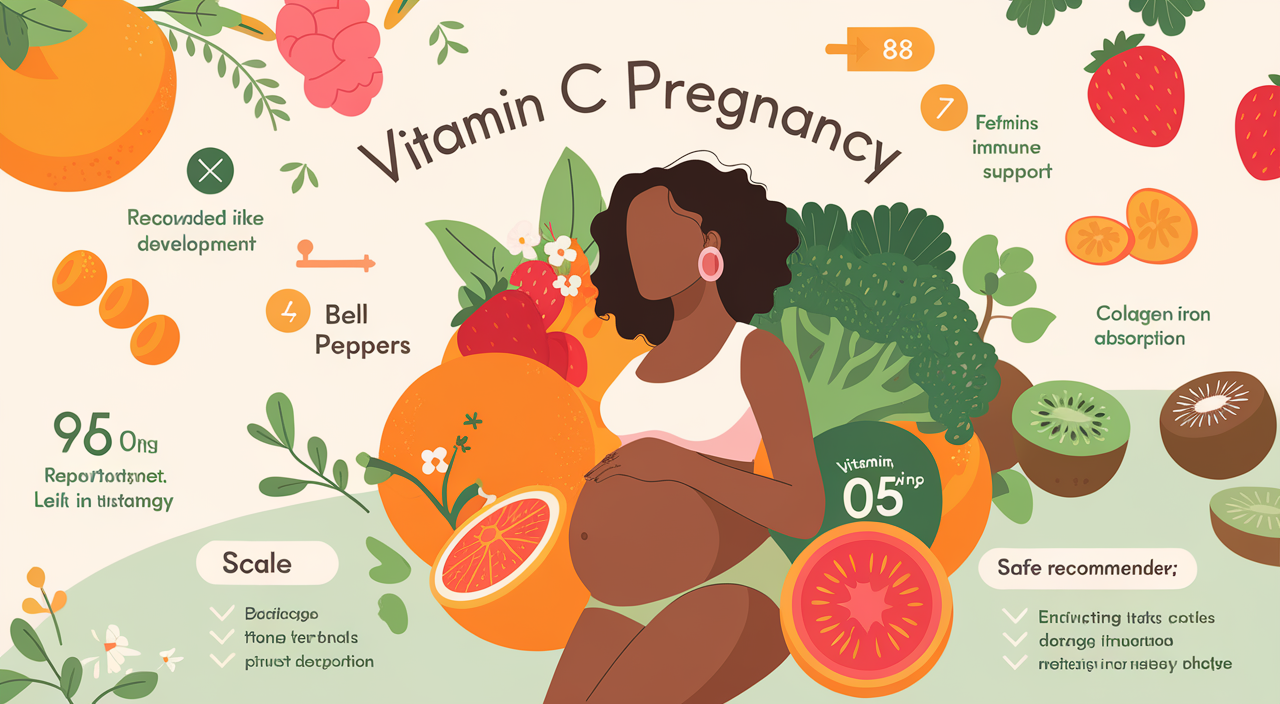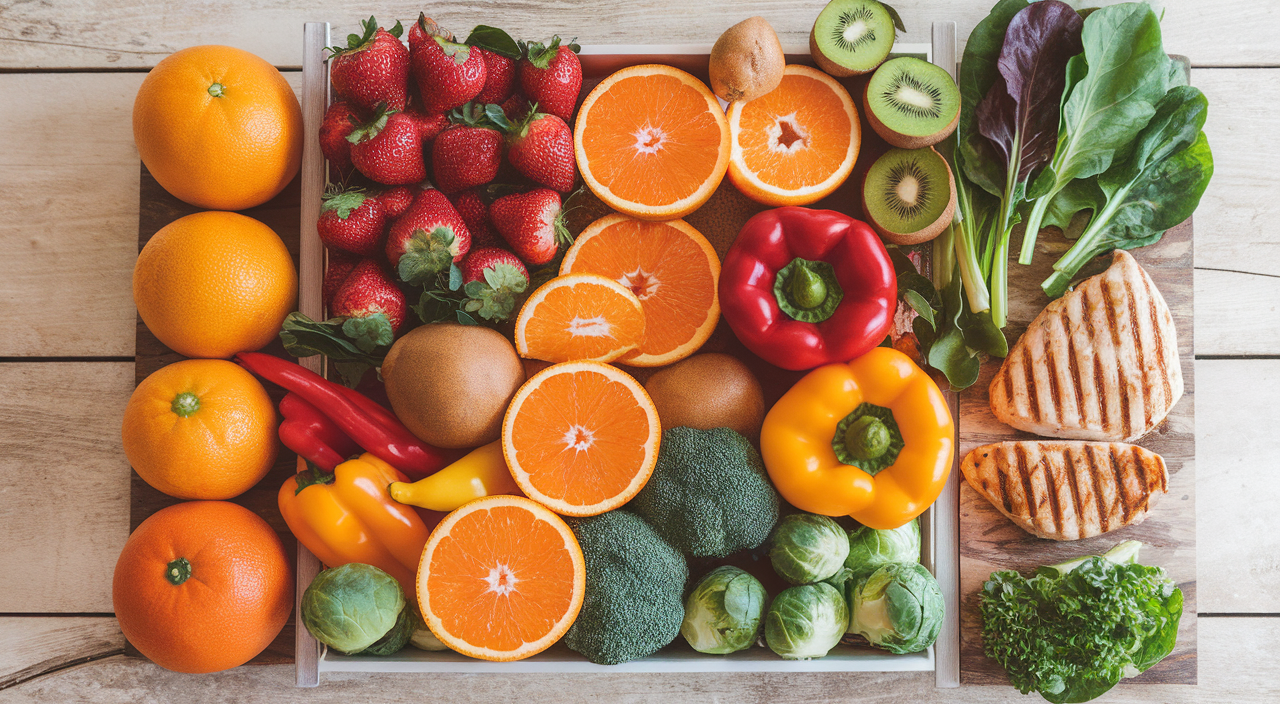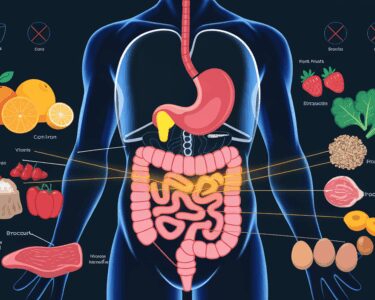Vitamin C for Pregnancy: Vitamin C plays a crucial role during pregnancy by supporting fetal development, promoting iron absorption, and strengthening the immune system for both mother and baby. Pregnant women need 80-85mg daily (increasing to 120mg while breastfeeding), with a safe upper limit of 2,000mg to avoid potential side effects like digestive discomfort or kidney stones.
Key Takeaways
- The recommended daily allowance of Vitamin C during pregnancy is 85mg for women 19 and older, with a safe upper limit of 2,000mg per day.
- Natural food sources like citrus fruits, strawberries, bell peppers, and broccoli should be the primary method of obtaining Vitamin C during pregnancy.
- Pregnant smokers require an additional 35mg of Vitamin C daily compared to non-smokers due to increased oxidative stress.
- Vitamin C supports critical pregnancy functions including healthy fetal bone development, blood vessel formation, and collagen production.
- Excessive Vitamin C intake (over 2,000mg daily) can lead to digestive issues, potential kidney stones, and in rare cases, infant vitamin C deficiency.
Your Essential Guide to Vitamin C During Pregnancy
Understanding Vitamin C for Pregnancy Benefits, Dosage and Safety Tips
I’ve found that Vitamin C plays a vital role in pregnancy, supporting both maternal and fetal health. Just like how somatic healing can boost overall wellness, adequate Vitamin C intake ensures proper development and immune function during pregnancy.
During pregnancy, Vitamin C acts as a powerful antioxidant, protecting both mother and baby from harmful free radicals. It’s similar to how cold therapy strengthens your immune system, but Vitamin C works continuously to maintain your body’s natural defenses.
This essential nutrient supports several crucial pregnancy functions:
- Promotes healthy fetal bone development
- Strengthens blood vessel formation
- Enhances iron absorption to prevent anemia
- Boosts collagen production for skin elasticity
- Supports tissue growth and repair
Smart Supplementation and Safety Considerations for Vitamin C for Pregnancy Benefits, Dosage and Safety Tips
While focusing on Vitamin C intake is important, much like maintaining your skin’s microbiome balance, it’s crucial not to overdo supplementation. The recommended daily allowance during pregnancy is 85mg, with a safe upper limit of 2000mg per day.
I’ve noticed that many pregnant women get excited about supplementation, similar to how people embrace AI for emotional support, but moderation is key. Natural food sources should be your primary method of getting Vitamin C during pregnancy:
- Citrus fruits (oranges, grapefruits)
- Bell peppers
- Strawberries
- Broccoli
- Potatoes
- Tomatoes
Current research shows insufficient evidence supporting high-dose Vitamin C supplementation during pregnancy. Instead, focus on maintaining consistent, moderate intake through a balanced diet and any prenatal vitamins prescribed by your healthcare provider.
What’s the Right Amount of Vitamin C When Pregnant?
Vitamin C for Pregnancy Benefits Dosage and Safety Tips: Daily Requirements
During pregnancy, your body needs extra nutrients to support both you and your growing baby. Just like maintaining a balanced microbiome for health, getting the right amount of Vitamin C is crucial for optimal pregnancy wellness.
Pregnant women aged 19 and older need 85mg of Vitamin C daily, while pregnant teens between 14–18 years require 80mg. These requirements jump to 120mg during breastfeeding, similar to how somatic healing supports bodily needs during recovery.
Food Sources and Supplement Safety for Vitamin C
I recommend focusing on food sources first when considering Vitamin C for pregnancy. Natural sources provide additional nutrients that support your pregnancy journey, much like how cold therapy benefits overall wellness.
Here are the best food sources to meet your daily Vitamin C needs:
- Citrus fruits (oranges, grapefruits, lemons)
- Strawberries and other berries
- Fresh tomatoes
- Broccoli and leafy greens
- Bell peppers (especially red ones)
If you’re considering supplements for Vitamin C, stay within safe limits. Adults shouldn’t exceed 2,000mg daily, while teens should stay under 1,800mg. This careful approach to supplementation mirrors how mindful wellness practices support health.
Remember to spread your Vitamin C intake throughout the day rather than taking it all at once. This helps maximize absorption and reduces any potential digestive discomfort.
Safety First: Understanding Vitamin C Risks During Pregnancy
Understanding Vitamin C for Pregnancy Benefits, Dosage and Safety Tips: Key Risks
I’ve found that managing Vitamin C intake during pregnancy requires careful consideration, similar to how healing requires balance in our body. While this essential nutrient supports healthy fetal development, excessive amounts can trigger unwanted effects.
Taking more than 2,000mg daily can lead to digestive problems like nausea, diarrhea, and stomach cramps. Just as cold therapy affects our system, high doses of Vitamin C can impact our body’s natural balance.
Here are the primary risks associated with excessive Vitamin C intake during pregnancy:
- Increased risk of kidney stones from very high doses
- Digestive system disruptions including cramping and diarrhea
- Potential interference with vitamin B12 absorption
- Rare cases of infant vitamin C deficiency from maternal overconsumption
Essential Safety Guidelines: Vitamin C for Pregnancy Benefits, Dosage and Safety Tips
I recommend staying within the recommended pregnancy dosage range, as maintaining proper balance is crucial for both maternal and fetal health. Two documented cases showed infant deficiency when mothers consumed over 400mg daily, highlighting the importance of proper dosing.
Despite concerns, research hasn’t established any direct link between vitamin C supplementation and increased risks of miscarriage or birth defects. However, like how emotional well-being requires careful attention, vitamin C supplementation during pregnancy needs proper monitoring.
Important safety measures include:
- Consulting your healthcare provider before starting any supplementation
- Regular monitoring of vitamin C levels through pregnancy
- Watching for signs of digestive issues or discomfort
- Being aware of potential interactions with other supplements
- Maintaining a balanced diet rich in natural vitamin C sources
Special Groups Who Need Extra Vitamin C Care During Pregnancy
Smokers and Vitamin C for Pregnancy
Smoking during pregnancy significantly increases the body’s need for vitamin C. Pregnant smokers require an additional 35mg of vitamin C daily compared to non-smokers in order to counteract the increased oxidative stress caused by tobacco use. It’s essential to discuss healing techniques for stress management with your healthcare provider while working on smoking cessation, as reducing stress can aid both in quitting smoking and improving nutrient absorption.
Dietary Restrictions and Medical Conditions
Access to fresh fruits and vegetables is an important factor in meeting vitamin C requirements during pregnancy. Certain groups face elevated risks of deficiency and thus need special consideration when it comes to Vitamin C for Pregnancy Benefits Dosage and Safety Tips:
- Women following restricted diets
- Those with malabsorption conditions
- Individuals with limited access to fresh produce
- Pregnant people with diabetes or gestational diabetes
- Those with inflammatory conditions
For these groups, integrating natural wellness practices can complement vitamin C supplementation strategies. A healthcare provider can help determine the most appropriate dosage based on your individual health profile and dietary needs.
Certain medical conditions can dramatically affect how vitamin C is processed in the body. Conditions such as kidney disease or hemochromatosis may change your ideal intake, and standard supplementation guidelines may not apply. It’s crucial to seek personalized advice from your doctor before starting or adjusting any supplement routine.
Supporting your gut health plays a significant role in vitamin C absorption. Maintaining a proper microbiome balance may enhance the effectiveness of supplementation for those experiencing digestive issues.
In my experience, the best results often come from combining targeted supplementation with tools for stress management. Together, these strategies can help to support overall pregnancy health. Regular monitoring and personalized adjustments to your Vitamin C for Pregnancy Benefits Dosage and Safety Tips ensure that both mother and baby receive optimal nutritional support throughout pregnancy.
Remember, these recommendations are not a substitute for professional medical guidance. Always consult your healthcare provider to develop a plan suited to your unique health history and current pregnancy needs.
Getting Your Daily Vitamin C: Food Sources
Natural Food Sources Rich in Vitamin C
Just like healing happens naturally in our bodies, getting enough Vitamin C for pregnancy benefits can be achieved through whole foods. Citrus fruits lead the pack, but many other delicious options pack a powerful punch. Here are the top food sources to consider for optimal Vitamin C during pregnancy:
- Oranges and grapefruits (75–85mg per medium fruit)
- Bell peppers, especially red and yellow varieties (95mg per 1/2 cup)
- Strawberries (85mg per cup)
- Kiwi fruit (70mg per medium fruit)
- Broccoli (51mg per 1/2 cup cooked)
- Brussels sprouts (48mg per 1/2 cup cooked)
Smart Tips for Maximum Vitamin C Absorption
I’ve found that proper storage and preparation methods make a huge difference in maintaining Vitamin C content. Similar to how cold therapy preserves body functions, correct storage preserves vitamin content. Fresh fruits and vegetables start losing their Vitamin C content the moment they’re harvested, but these practical tips can help maximize retention:
- Store fruits and vegetables in the crisper drawer of your refrigerator.
- Keep produce away from direct sunlight.
- Cut fruits and vegetables right before eating.
- Steam or microwave vegetables instead of boiling.
Looking for easy ways to boost your Vitamin C intake for pregnancy benefits? Try adding sliced strawberries to your breakfast, just as maintaining skin health requires daily care. I recommend preparing a colorful salad with bell peppers for lunch, or enjoying citrus fruits as afternoon snacks. These simple additions can help meet your increased Vitamin C needs during pregnancy.
Quick-cooking methods help retain more nutrients than lengthy cooking processes. Steam vegetables briefly until they’re tender-crisp, maintaining their bright colors and nutritional value. Think of it like creating positive daily habits – small changes in food preparation can make a significant difference in getting the most Vitamin C for pregnancy benefits, dosage, and safety.
For maximum absorption of Vitamin C during pregnancy, pair Vitamin C-rich foods with iron-rich foods like leafy greens or lean meats. This combination helps your body absorb iron more efficiently, which is crucial during pregnancy.
Getting enough nutrients during pregnancy is essential, and understanding the importance of this vitamin can help support both maternal health and fetal development.
Sources:
MotherToBaby – Vitamin C
PubMed Central – Vitamin C supplementation in pregnancy
BabyCenter – Vitamin C during pregnancy
WHO eLENA – Vitamin C supplementation in pregnancy
Kin Fertility – Vitamin C In Pregnancy: Immunity Benefits & Baby Development
Apollo Cradle – The Importance of Vitamin C During Pregnancy
NCBI Bookshelf – Vitamin C – Mother To Baby | Fact Sheets











